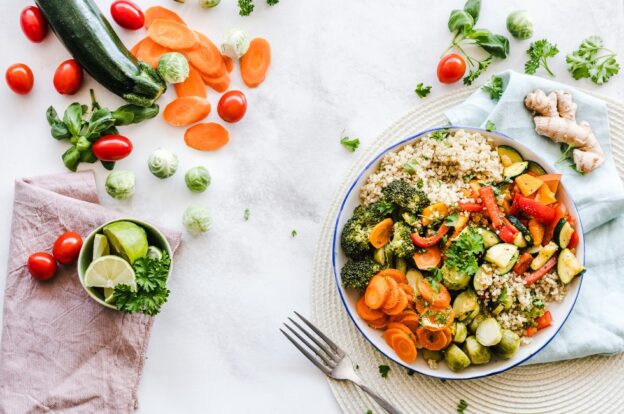March is National Nutrition Month. This campaign, held once a year, was started years ago by the Academy of Nutrition and Dietetics. The purpose is to spread awareness and education about how to make well-informed decisions in regard to what you put into your body.
We all know that healthy eating is crucial for maintaining a healthy weight. It is also necessary for preventing things like diabetes and heart disease. However, many people don’t realize just how much the foods we eat have an impact on our mental health. The healthier you eat, the better you are going to feel both mentally and physically. Additionally, if you are currently on your recovery journey, getting the proper nutrition can really make a huge difference and help you along the way.
Preventing Stress and Depression Through Proper Nutrition
Did you know that you can literally eat your way to good mental health? You can, and you can actually prevent stress and depression by doing so. The key is knowing what to eat and what to avoid. There is an interesting link between stress and food. Certain foods can actually trigger stress and make it worse. At the same, these are the same foods that we often turn to in order to cope with stress and depression. When people are stressed, they tend to eat more. They also tend to reach for foods that aren’t exactly the healthiest.
Foods that are heavily processed and high in sugar are actually some of the worst things you can consume for your mental health. These types of foods can make your stress levels exponentially worse. What you should focus on eating instead are foods that are high in omega-3 fatty acids. Some great go-tos are salmon, mackerel, sardines, oysters, soybeans, chai seeds, flaxseeds, and beans. Including as many leafy green vegetables in your diet as possible can also be great for fending off depression.
When you are eating well, you’re going to feel your best mentally. When you are in a great place mentally, the better able you will be to make good decisions and stay firmly on your path of recovery.
Changing Your Relationship With Food
A big part of increasing the nutrition in your diet is changing the relationship and habits you have with food. Consider how you start your day on a regular basis. Maybe it is typical for you to grab a cup of coffee (or several) and survive off of that until lunchtime. You might be surprised by how much better you feel when you replace that coffee with a proper breakfast. You want a breakfast that is rich in protein and full of fruits and vegetables. With such a meal to start your day, you are likely going to have more energy and feel less sluggish in the late afternoon. Your blood sugars will also improve.
Maybe you don’t have a lot of time and frequently find yourself stopping for fast food instead of cooking a meal for yourself. If so, you might benefit from meal prepping. Instead of having to cook every single day of the week, you can set aside just one day. A week in advance, you can plan what sort of recipes you want to prep. You can then go out and purchase the proper ingredients and make a large batch of each recipe so that it will last you for the week. You can then portion the meals out into portable containers that you can grab and take with you to work or wherever you may need to go throughout the week. This makes eating healthy as simple and easy of a decision as possible.
Consider what kinds of foods you tend to grab when you’re feeling stressed or looking for comfort. While chips or pizza might sound good, they are not necessarily going to help you feel better in the long run. Focus instead on lean proteins (like chicken, fish, and eggs), complex carbohydrates (like quinoa, brown rice, and sweet potatoes), and foods full of fatty acids.
Celebrating National Nutrition Month
There are so many different positive ways that you can celebrate National Nutrition Month this March. Perhaps one of the most important ways is by continuing to educate yourself about what the best foods are to put into your body and what you should eat in moderation or avoid entirely.
You can also work to spread further awareness about the importance of nutrition on mental health and overall well-being. In addition, consider keeping the community and environment in mind by choosing foods with minimal packaging and buying locally whenever possible.
A lot of people who have struggled with substance misuse in the past are deficient in certain vitamins and nutrients that are crucial for their well-being. If this is your situation, consider working with a nutritionist. They can help you get back on track by recommending certain foods that will replenish whatever nutrients you’re lacking.
If you want to improve your mental health, one of the most important things you can do is start with the basics and look at what you’re putting into your body. Your mental and physical health are more closely related than you might realize. When you’re eating foods that aren’t good for you physically, your mental health might begin to suffer as a result. When you’re struggling with your mental health, it can play a role in your recovery journey. If you are struggling with substance misuse, our team at The Ho Tai Way can help. Don’t wait; give us a call at (714) 581-3974 today to learn more about the services we provide.









